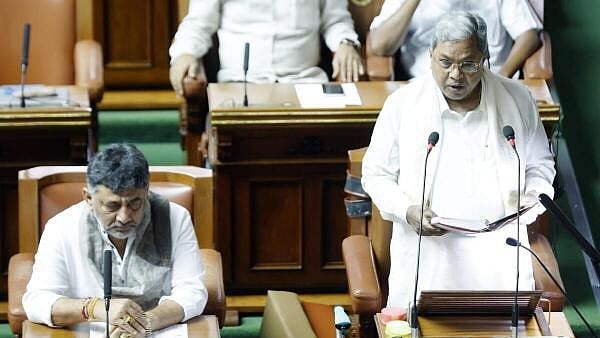
Karnataka Chief Minister Siddaramaiah presents the state Budget 2025-26, in Bengaluru on Friday.
Credit: PTI Photo
Kalaburagi: Mechanisation, research, integrated farming and water management have emerged as priority areas in agriculture in the state budget.
Presenting his 16th Budget on Friday, Chief Minister Siddaramaiah announced assistance of Rs 428 crore to 50,000 farmers under farm mechanisation scheme and Rs 440 crore to 1.81 lakh farmers for adoption of micro irrigation in raid-fed areas.
Funds allocation of Rs 88 crore is given for adoption of new technology in tur production and to encourage crop expansion.
With an aim to promote sustainable organic farming, the government plans to convert Joida taluk in Uttara Kannada district as the first ‘organic taluk’ in the state.
Development of integrated farming system plots in all 10 agro-climatic zones of the state, establishment of 5,000 new micro-food processing units, and construction of 12,000 farm ponds are some other highlights of the Budget. A total of 58 laboratories under the agriculture department will be strengthened with advanced scientific instruments and technologies for the farmers.
Integrated soil and water management, proper waste management, efficient water utilization and integrated nutrient management will be implemented in collaboration with sugar factories in 3,000 hectares of farm land in Belagavi, Bagalkot, Vijayapura, Kalaburagi and Mandya.
The government announced the establishment of a plant phenotyping facility at Gandhi Krishi Vignana Kendra, Bengaluru to conduct research on drought and disease-resistant characteristics of crops and develop improved varieties of breeds.
Organic and Millet Hub will be established at a cost of Rs 20 crore. Funds of Rs 25 crore have been allocated to build basic infrastructure for proposed Mandya Agriculture University. Agriculture Research Station will be established at Muddebihal taluk of Vijayapura district.
Horticulture and sericulture
The government announced Comprehensive Horticulture Development Scheme-2.0 with an outlay of Rs 95 crore to ensure the technological advancements in value addition, processing, cropping pattern.
To conserve 20 GI-tagged and other indigenous crops, a seed bank will be established. A Knowledge Cell will be set up by the Indian Institute of Space Science and Technology in partnership with the private players to provide farmers with real-time data on various aspects from crop health to market data.
An allocation of Rs 426 crore will be made under the micro irrigation scheme to provide financial assistance to 52,000 farmers. Funds of Rs 62 crore has been provided for plant protection measures to control leaf spot disease to arecanut crop while research and conservation activity will be conducted to protect Byadagi chilli from leaf-curl disease.
In sericulture, to meet the domestic demand for international grade bivoltine raw silk, the focus will be on setting up of automatic silk reeling units of 120 ends. The second phase of works for construction of Ramanagar and Sidlaghatta hi-tech silk markets will be taken up at a cost of Rs 250 crore. The government also announced the establishment of a silk cocoon market in Mysuru. Under the Silk Development Programme, Rs 55 crores will be allocated for pre and post silk cocoon activities.